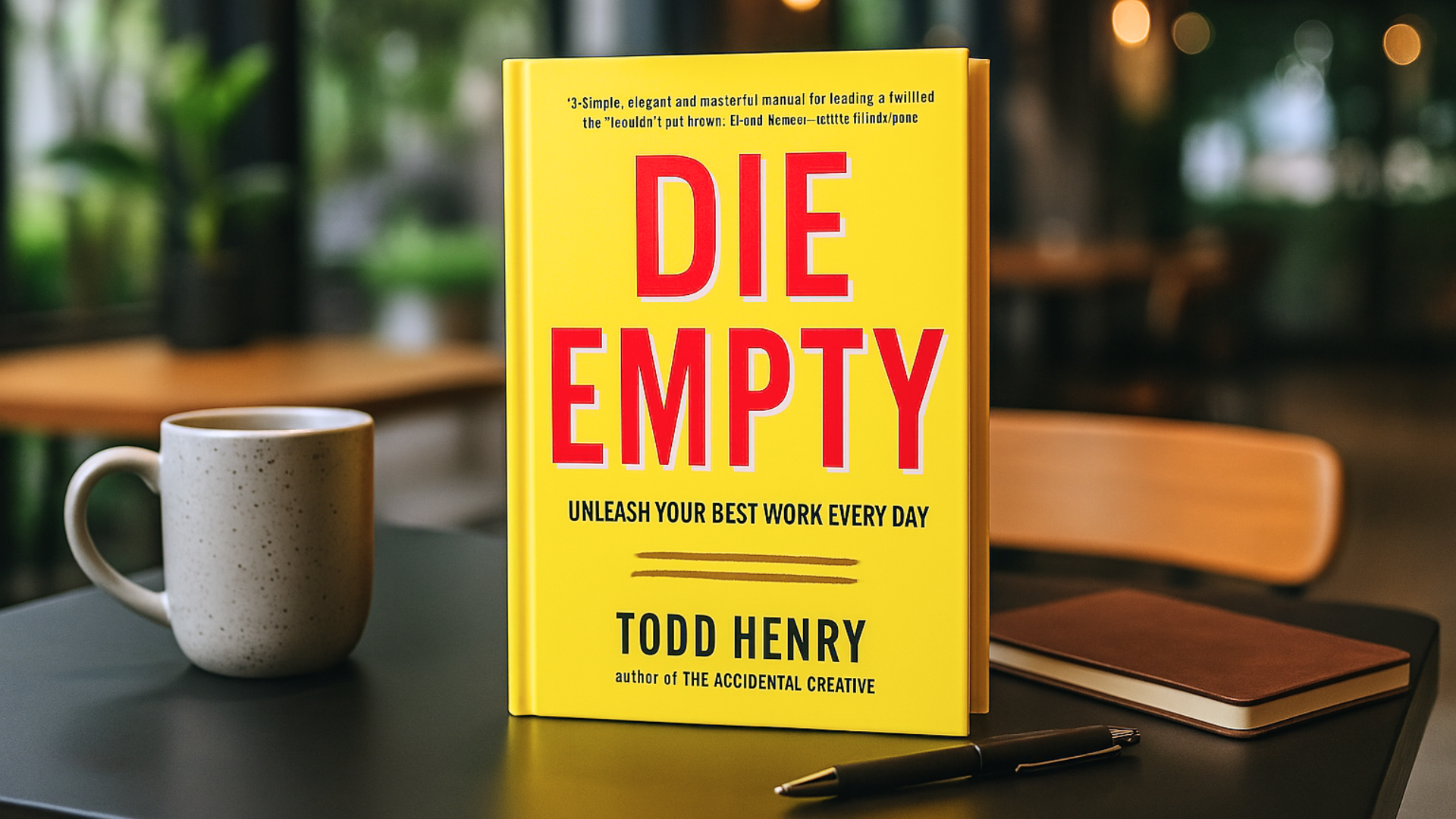Stop Postponing What Matters: A Review of Die Empty

Book Review: Die Empty by Todd Henry
A practical and motivating call to contribute your best work every day
Todd Henry’s Die Empty is not just about getting more done. It is a clear call to live and work with intention, so your best ideas do not go unspoken or unfinished. With decades of experience coaching professionals and creatives, Henry shares how urgency, clarity, and consistent effort can help people bring their most important work into the world.
This is a book about meaning, not just productivity. It asks a bold question: will you leave your greatest contributions behind because you failed to act, or will you choose to show up fully while you still can?
What the book promises
Henry opens the book with the idea that the most valuable land in the world is the graveyard. There lie all the ideas, inventions, and creative work that were never realized. His promise to the reader is simple but powerful: you do not have to end your life with regret if you commit to using your time and talents with intention today.
The book is not about doing more or chasing titles. It is about aligning daily work with purpose. Henry outlines a framework to help readers identify the barriers that often prevent action and replace them with habits that support focus, contribution, and personal fulfilment.
What the book delivers
Die Empty delivers a practical and structured roadmap for meaningful work. Henry explains that people tend to drift into unintentional habits that dilute their energy and limit their potential. He addresses this through clear, actionable strategies for identifying personal values, setting priorities, and managing focus.
The book is divided into three sections. The first discusses why so many people settle for mediocrity or delay meaningful work. The second introduces seven core challenges, such as fear, aimlessness, and comfort, that often block action. The third section offers practices and mindsets that support a consistent and intentional work ethic.
Henry introduces the idea of three essential types of work: Mapping (planning), Making (executing), and Meshing (learning and integrating). He explains how effective individuals understand and balance these in their daily routines. This framework gives the book structure without making it rigid, and it can be applied across roles and industries.
Style and structure
The writing style is clear, direct, and motivational. Henry is not overly academic or abstract. He uses accessible language, real-world examples, and concise chapters that are easy to follow. At the end of most sections, he includes reflection questions to help readers apply the content to their own lives.
The tone is professional but never cold. He speaks like a coach, someone who is rooting for you but is also unafraid to challenge you. He balances encouragement with accountability, reminding the reader that meaningful work does not happen by accident. It requires attention and deliberate effort.
The layout is helpful for readers who want to dip in and out. It is equally useful as a cover-to-cover read or as a guide for reflection over time. Each chapter introduces one main idea and then builds on it with stories and steps for application.
Where the book shines
One of the strongest aspects of Die Empty is how it reframes the concept of urgency. Henry does not encourage burnout or speed for its own sake. Instead, he urges readers to take their best ideas seriously now, instead of assuming there will always be more time later.
His concept of the “Developer” work profile describes someone who consistently integrates planning (Mapping), execution (Making), and learning (Meshing). This offers a practical way to evaluate how you are spending your energy. Readers who often feel busy but unfulfilled may find clarity in this model. It helps identify whether time is being spent on meaningful progress or on reactive tasks that do not move a project forward.
Henry also addresses emotional resistance directly. He speaks to the fear of failure, the pull of comfort, and the weight of expectations. His message is clear: these feelings are real, but they do not have to decide what you do next. You can still choose action over avoidance.
Light limitations
While the book is rich with insight, it is focused primarily on high-functioning professionals and creative workers. Readers in more constrained circumstances, such as those managing burnout or structural barriers, may need to adapt the message to their own context. The advice presumes a certain level of autonomy over one’s time and attention.
The repetition of core themes like urgency and legacy reinforces the book’s message, but some readers may find a few sections overlap in tone or content. Reading the book slowly or in small doses may help retain its impact without feeling redundant.
Finally, the focus remains mostly on personal responsibility. While this is empowering, it may feel limiting for readers who are navigating organizational systems that do not support creative risk or individual ownership.
Final thoughts
Die Empty is a focused, thoughtful book that invites the reader to stop postponing what matters most. Todd Henry does not offer gimmicks or shortcuts. He offers clarity, structure, and encouragement to help readers build a body of work they can be proud of.
This book will resonate with professionals who feel stuck in routine or distracted by low-value tasks. It will also speak to those who want to align their work with deeper meaning, even if they are unsure where to begin. Henry’s message is not about chasing success. It is about honouring your potential through action.
The reminder is simple: your best work will not happen someday unless you begin today. You do not need to wait until everything feels ready. You just need to begin.
Highly recommended for readers ready to close the gap between what matters and what gets done.